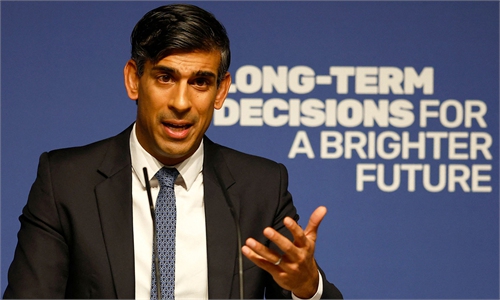Do not interpret China's participation in global AI safety summit narrowly
The first global AI safety summit ambitiously organized by the UK is set to take place on November 1 and 2. Right from the inception of the event's planning in the UK, there was a question of whether China would be invited and whether China would attend. According to latest UK media reports, Wu Zhaohui, vice minister of science and technology, along with representatives from the Chinese Ministry of Foreign Affairs, tech companies, and academic institutions, have been invited to attend. They will engage in discussions with peers from around the world on issues related to the secure development of AI technology in pursuit of international consensus.The participation of Chinese representatives has sparked a lot of discussions in the international media and has been given additional significance. Some people view it as "another sign of the thaw in China-UK relations," and the POLITICO Europe has stated that if the UK brings China and the US together, it will be a major diplomatic coup. These interpretations are all from a perspective of international relations or geopolitics, and frankly speaking, they are somewhat narrow and limited. Although AI is primarily a technological topic, the global AI safety summit hosted by the UK has never been devoid of the influence of domestic politics, geopolitics, values and ideologies all along. These factors will be obstacles and constraints on the achievement of results at this conference in the future.
Since it's called as a "global AI safety summit," excluding China, which boasts the world's largest AI application market, would be ironic. The UK is just a step away from this. The voices of opposition against inviting China have been quite loud among some British politicians. Even after the UK government decided to extend the invitation, there were still some vehement "dissenting voices" within the UK, with former prime minister Liz Truss even writing a letter requesting incumbent Prime Minister Rishi Sunak to rescind the invitation. This forced Sunak to provide an explanation and emphasize that inviting China is "the right thing to do." The resistance faced by the UK in making the right decision has been a common theme in recent years among Western countries.
In contrast, China considers the inherent complexity and necessity of things when making decisions. China's decision to send representatives to the summit is rooted in the belief that it is necessary, without allowing some narrow-minded attitudes within the UK to deter its participation. This demonstrates China's openness and its responsible approach to the well-being of all humanity.
AI is a new field of human development. Everyone can see the tremendous opportunities brought about by the rapid development of global AI technology, as well as the unpredictable risks and complex challenges. This is a common issue that concerns the fate of all mankind and the countries of the world. However, global AI governance lags far behind the speed of technological development. The world urgently needs to reach a basic consensus on this issue in order to equip rapidly developing AI technology with a global unified standard steering wheel and brakes, so that it can better serve the well-being of all mankind, rather than becoming a new tool of hegemony for some major countries or even facilitating large-scale new types of crimes. Therefore, the world needs more comprehensive discussions. The UK hosting this global AI safety summit provides an opportunity for such discussions, regardless of any subjective calculations. China has supported the UK's move with practical actions.
It is worth mentioning that the three major global powers, China, the US and Europe, have recently made efforts in the global AI governance. On October 18, President Xi Jinping proposed the "Global AI Governance Initiative" in his keynote speech at the opening ceremony of the Third Belt and Road Forum for International Cooperation, systematically outlining China's proposals on AI governance from three aspects, namely, the development, security and governance. On October 30, US President Biden signed an executive order on AI, which was called the "most significant action any government anywhere in the world has ever taken on AI safety, security and trust." Prior to this, President Biden's top science advisor praised the UK's invitation to China to participate in the AI summit as a "terrific idea." The long-awaited Artificial Intelligence Act of the European Union has also entered the final negotiation stage.
If China, the US and the EU can reach some consensus on global AI governance, it would be of great significance. One key aspect, as mentioned in China's "Global AI Governance Initiative," is to oppose drawing ideological lines or forming exclusive groups to obstruct other countries from developing AI, as well as to oppose creating barriers and disrupting the global AI supply chain through technological monopolies and unilateral coercive measures. Whether this healthy and constructive mindset can be maintained not only affects the specific outcomes of this summit, but also the safe development of AI.
Biden signs executive order on AI regulation as Chinese experts warn against US politicizing technology
International cooperation needed in burgeoning sector to boost innovation, benefit humanity: expert By GT staff reporters
US President Joe Biden has issued an executive order on artificial intelligence (AI) that aims to monitor the cutting-edge technology while tapping its potential. Although they touch on matters of consumer protection, civil rights and innovation, the Biden administration's new rules are narrow-minded and risk turning AI into a political tool in next-generation technology competition, Chinese observers said.
They called for international cooperation in the research and development (R&D) and application of the state-of-the-art technology, which is the core of the Fourth Industrial Revolution and a sector that will have profound implications for all human beings.
According to a circular on the White House website, the executive order requires developers of AI systems that pose risks to US national security, economy, public health or safety to share the results of safety tests with the US government, in line with the Defense Production Act, before companies make them public.
Claiming that it has consulted widely on its AI governance frameworks with its allies and partners including Australia, Canada, the EU and Japan, the White House said that the document will "direct actions to counter adversaries' military use of AI."
Generally, AI can be applied in every industry, including the military. However, the Biden administration especially pointed out the need to "counter adversaries' military use of AI," reflecting its concerns in this respect, Wang Peng, an associate research fellow at the Beijing Academy of Social Sciences, told the Global Times on Tuesday.
While the US attaches importance to international competition by vowing to continue to lead in AI innovation, the Chinese regulations on generative AI content stress increasing the benefits brought to people and preventing potential risks, Wang said.
In July, China released an interim regulation on the management of generative AI services, which went into effect on August 15. It put forth measures on boosting generative AI technology on the one hand, and stipulated basic norms for generative AI service providers on the other.
"Both countries' regulations on generative AI services are just a form of general guidance, as there is yet no definition to problems such as AI platform monopolies. Moreover, laws are needed to restrain users of the technology, as some problems are produced by human beings rather than the technology itself," Liu Gang, director of the Nankai Institute of Economics and chief economist at the Chinese Institute of New Generation AI Development Strategies, told the Global Times on Tuesday.
Analysts warn against the potential for the US to politicize AI in next-generation technology competition, since the US has damaged the semiconductor market, a treasure for all human beings.
Amid mounting calls in the West to ban China's participation in the upcoming AI Safety Summit in the UK, Prime Minister Rishi Sunak defended the invitation.
"It's wise for the UK to invite China to attend the summit," Liu said. He said China plays a leading role in AI and 5G, and increased international exchanges in AI and digital technologies will contribute to the world's economy and sustainable development.
Wang said that the development and governance of AI has significant implications for all of humanity and the digital economy, and therefore requires global cooperation. "China plays a crucial role in digital infrastructure, the digital economy, markets, and relevant research, and therefore is an important link that shouldn't be omitted," Wang said.
China's AI sector has developed at an unprecedented speed this year despite an intensifying US blockade, with Chinese high-tech firms including Baidu and iFlytek rushing to deploy ChatGPT-like AI solutions. As of the end of August, 11 Chinese AI large language models, including Baidu's ERNIE Bot, had obtained approval for release to the general public.
China aims to promote the development of its computing power technologies - with a goal of increasing its computing power by about 50 percent to exceed 300 EFLOPS by 2025 - laying the infrastructure foundation for the development of the AI sector.
"As AI is critical to the Fourth Industrial Revolution, an international cooperation system needs to be established at an early date for countries to discuss the application of AI in society and potential problems, based on a series of consensuses," Liu said.
Amid escalating tech competition, the US recently tightened curbs on exports of state-of-the-art AI chips to China.
"The US measures seriously violated market economy principles and international trade rules, while aggregated the fragmentation of global semiconductor supply chains," the China Council for the Promotion of International Trade told the Global Times on Tuesday.
The Chinese business community firmly opposes the US acts, which benefit no one, and hopes the US side will cancel related restrictions and respond to the reasonable concerns of the global business community about opening-up and cooperation, the government agency said.
"Related enterprises across the world should maintain mutual trust and cooperation to jointly safeguard the safety, stability and smoothness of global supply and industry chains," it said.
RELATED ARTICLES






No comments:
Post a Comment